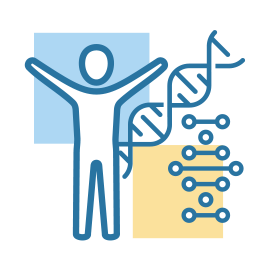JOIN THE FAMILY NETWORK
Join a community that understands exactly what you're going through.
This journey can feel lonely, but you’re not alone. Join our Family Network to connect with other Glut1 Deficiency families, share resources, learn from each other, and experience a supportive community that cares about you.

Take your next step.

Enroll in the NHS
Enroll in the Glut1 Deficiency Natural History Study to share your experiences and help tell the life-long story of Glut1 Deficiency.
Learn about Ketogenic Diets
Discover how medical Ketogenic Diets can help manage symptoms and find resources and support to help make it easier and more effective.

Find Additional Resources
Browse our additional resources to help you find answers and be better prepared to meet the day to day challenges of this disease.

Attend Our Biennial Conference
Meet, share, and learn with us at our next conference, or explore resources from previous ones.
Explore the Latest Research
We partner with medical professionals and researchers to advance progress towards a cure.
Attend a Glut1 Gathering
Connect with other families from around the world via our regular Glut1 Gatherings on Zoom.
Ask for help.
Glut1 Community Connect
Turn to the real experts in the community - others who have been in your shoes and have wisdom and experiences to share. We've created a safe and secure place for families to meet, share, and learn on Glut1 Community Connect - built on the Discourse platform and the only online group managed, moderated, and screened by the G1DF.
You'll receive an invitation to join shortly after signing up for the Family Network - stop in, introduce yourself, and browse the conversations or start your own to find trusted information and a network of support.
Friends and Family Members
A rare disease journey can be lonely and isolating. Sometimes even the closest and most well-intentioned friends and family members don't really understand, know how to help, or even know the right words to talk with you about how you feel or what you need.
We put together a guide for you to download and share to get the conversations started and help your loved ones better understand Glut1 Deficiency, the challenges and uncertainties you might be facing, and how they can help support and encourage you.
Frequently Asked Questions
Glut1 Deficiency is caused by variants or mutations in the SLC2A1 gene, although not all patients will have a genetic variant detected on current testing. The SLC2A1 gene is responsible for producing and regulating the glucose transporter type 1 protein (Glut1). Glut1 is responsible for moving glucose across the blood brain barrier. Glucose is a primary source of energy for all cells and plays a vital role in brain metabolism. When there isn’t enough Glut1 or it isn’t functioning properly, glucose doesn’t reach the brain as well as it should, and many neurological symptoms result.
There is a wide range of symptom severity, and not every person with Glut1 Deficiency experiences the same symptoms, so this makes it difficult to predict what an individual experience and future might hold. Some patients are very mildly affected with just a symptom or two and are able to lead an independent life, while others are quite severely impacted and might be unable to walk, talk, or function independently. Most fall somewhere in between.
It is also important to remember that less is known about the adult experiences in Glut1 Deficiency, especially later in life. Symptoms and severity do not seem to be progressive over the lifespan, although there can be fluctuation in severity and change in symptoms as patients age. There is no known impact on life expectancy, although there are increased risks associated with any type of epilepsy for seizure related deaths or SUDEP (Sudden Unexplained Death in Epilepsy).
The good news is that most people with Glut1 Deficiency, regardless of age, respond well to a ketogenic diet and experience improvement in many symptoms. There are many ketogenic diet resources and links available on our website.
There is no cure for Glut1 Deficiency, so treatment is aimed at managing symptoms. The current standard of care is a medically supervised ketogenic diet. Ketogenic diets are high fat, moderate protein, and low carbohydrate diets that cause the body to produce ketones, which the brain can use as a fuel source when glucose is limited. There are likely other mechanisms at work in explaining how ketogenic diets can help the symptoms of Glut1 Deficiency, but those are not yet well understood.
Research has shown that the earlier someone is diagnosed with Glut1 Deficiency and begins treatment with a ketogenic diet, the better the outcomes. There is research underway to identify other options for patients and families for easier and more complete treatments as well as for those who many not respond well to a ketogenic diet.
Additionally, other types of support are beneficial in treating Glut1 Deficiency, such as speech and language, occupational, and physical therapies. Special supports and plans in place in the classroom (such as IEP’s, Individualized Education Plans, and 504 plans) are also very helpful in optimizing academic success and the overall school experience, and special accommodations in the workplace can also be important forms of support.
Glut1 Deficiency is a rare disease, and currently we believe there are about 2,000 people diagnosed worldwide. Without a formal way to report and track patients, it is very difficult to know exact numbers, and that is one of the reasons why projects like the Glut1 Deficiency Natural History Study is so important. Recent research has also estimated that the true prevalence is at least 1 in 24,000, which means there are many more people still to find who need a life-changing diagnosis.
Take some time to come to terms with this new diagnosis and what it means for you and your family. It often comes as a big relief to have answers, but there can also be a grieving process that is important to acknowledge. Once you are ready, there are many ways you can empower yourself on this new journey and put your hope for a brighter future into action. Look through our many resources to find information and opportunities to help you better understand this disease and help you be an advocate for you, your loved one, and everyone in the Glut1 Deficiency community.
Most cases of Glut1 Deficiency are caused by a de novo variant or mutation, which just means it is a new, spontaneous one that happened for the first time with no known cause. This means that neither parent has the genetic variant and it wasn’t inherited. However, when someone is affected by Glut1 Deficiency and has a genetic variant, it can be passed on to offspring with each child having a 50% chance of inheriting the disease from their parent. It is an autosomal dominant inheritance pattern, which means it only takes one mutated copy of the gene (out of two) to cause disease.
Talk to your doctors about your diagnosis and create partnerships when possible. You will be the expert in many circumstances, so it is important that you understand this disease well, keep up with new advancements and research, and feel confident in being an advocate for yourself or your child. The Glut1 Deficiency Foundation can send brochures for you to share with your healthcare team, and the expert consensus guidelines are another helpful resource to share. You can also send them to this website for additional resources, and even invite them to join our Professional Network and attend one of our conferences!
We have created a directory of healthcare providers who have been recommended by Glut1 Deficiency families for their experience, compassion, and the quality of care they provide. You may find that Family Recommended Specialist List here. It is also important to remember that a willingness to learn about a disease and a commitment to caring for patients well can be a good substitute for experience, so you can help create the next generation of Glut1 Deficiency experts through partnerships and collaborations with your healthcare team.
The Glut1 Deficiency community is like a family, and you’ll find many who are eager to welcome you and help you on this new journey. We have created a secure, private forum where you can connect with other families, ask questions, share ideas, and give and get support – Glut1 Community Connect on the Discourse platform. You’ll receive an invitation to join when you sign up for the Family Network. You can also join our quarterly Glut1 Gatherings on Zoom to learn and meet families from all over the world, or if you are an adult living with Glut1 Deficiency, you can join the Overcomers Zoom group which meets monthly. Every other year, we host our conference where we meet, share, and learn with patients, families, clinicians, researchers, and other stakeholders who are working hard to help us all reach for a brighter future.
